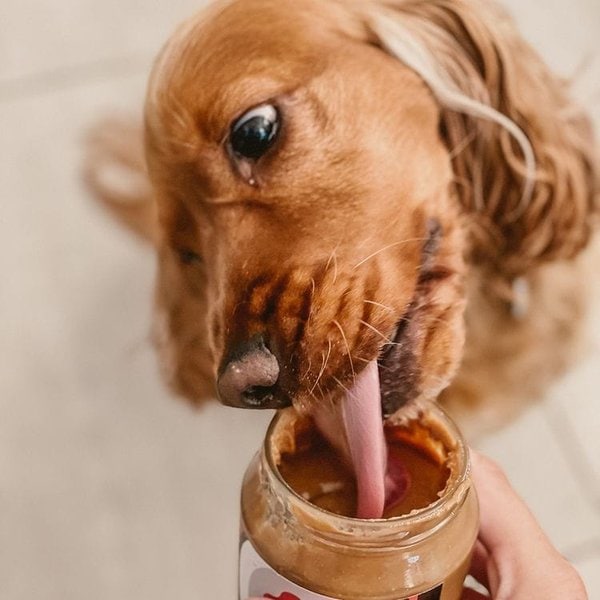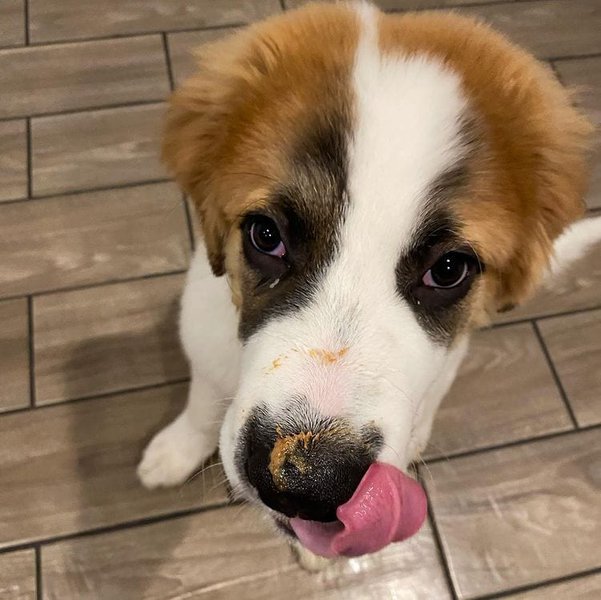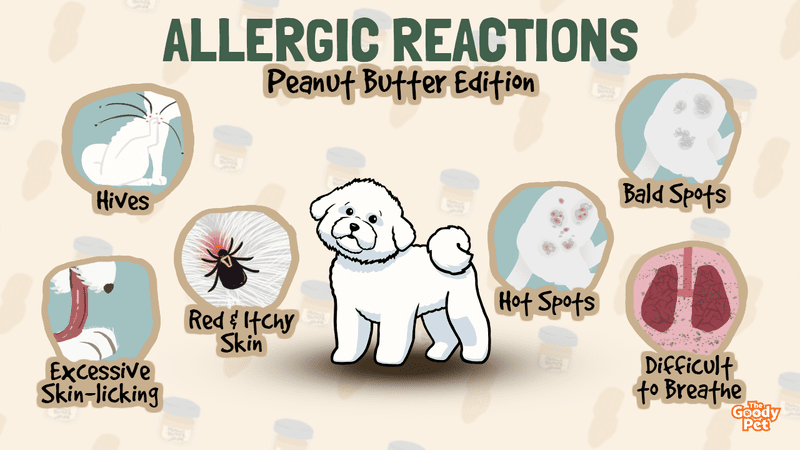Spread on toast, slather on PB&J, dress on oatmeal, add to speedy curries, or just spoon it straight out of the jar – there are a plethora of ways to enjoy it. However, to the few unfortunate, this pantry staple remains a no-no owing to allergies. But can dogs be allergic to peanut butter?
Yes, some, but not all, dogs can be allergic to peanut butter. Peanut butter allergy happens when a dog’s immune system misinterprets the ingested ingredients as harmful. Pups with this allergy usually develop red and itchy skin after eating peanut butter, but we still see other side effects in dogs.
Now that you are here, chances are your dog is allergic to peanut butter or perhaps are beginning to suspect it and want to learn more. And yes, we crafted this article just for that purpose. By the time you get to the bottom, you should be able to tell whether or not your dog is allergic to peanut butter, how to go about it if it turns out that your Fido is allergic to this treat, and so much more. Let’s begin with first things first!
What Happens If My Dog Is Allergic To Peanut Butter?

What happens to dogs allergic to peanut butter is that they exhibit signs of allergies after consuming it. The symptoms vary from mild to severe and can come minutes after ingestion or over time with regular feeding.
You see, much like you and me, dogs have allergies. It could be to foods or other allergens like pollen, dust mites, or even other dogs. At times they will come from things we generally consider healthy for them, things we least expect – and peanut butter is a perfect example.
After an allergic dog to peanut butter eats the treat, the immune system knows it immediately and triggers a series of reactions to help fight what it perceives as harmful to your canine. It does this by sending a signal to all mast cells in the lungs, blood, mouth, and gut. It’s one message to all – “release histamines!”
To better understand how histamines work, think about bouncers in a club – how they immediately remove anyone causing trouble around. Now, that’s how histamines work – they get rid of anything causing issues in your dog’s body, now what we call allergens.
After the immune system identifies an allergy trigger in peanut butter, histamines do whatever it takes to remove the allergen. Actually, what we refer to as signs of allergies are the attempted efforts of histamine to remove the foreign element.
How Can You Tell If Your Dog Is Allergic To Peanut Butter?
You can only tell that your dog is allergic to peanut butter after they eat it. That’s why most vet nutritionists recommend giving small amounts of peanut butter the first time. Tiny quantities minimize the likelihood of severe consequences in case the dog turns out to be allergic.
Dogs allergic to peanut butter will most of the time show it through signs. But again, no two dogs will respond the same to allergens in peanut butter. We have some common symptoms of peanut allergies in dogs, though. They include;
- Hot spots or moist dermatitis
- Red and itchy skin
- Excessive licking of the skin
- Swelling
- Hives
- Difficulty in breathing
- Bald spots
What you see in your dog will depend on the type of peanut butter allergy. Basically, there are two types of peanut butter allergies in dogs:
- Canine atopic dermatitis
- Internal bodily reaction
Canine atopic dermatitis manifests through skin irritations. Any dog with this type of allergy will develop red and itchy skin, bald spots, and other conditions that affect the skin.
On the other hand, dogs with internal bodily reactions may not show any signs through the fur or coat. Instead, they will develop more internal reactions such as difficulty in breathing and severe agitation.
Can Peanut Butter Cause Upset Stomachs In Dogs?
Yes, peanut butter can cause an upset stomach in dogs. However, an upset stomach after eating peanut butter isn’t always a sign of an allergy. Any dog can develop this condition, even those not allergic to peanut butter.
As a dog parent, you likely know that canines have sensitive digestive systems. That four-legged member of the family will develop upset stomachs and other digestive issues from any food, even peanut butter.
For peanut butter, an upset stomach is likely when your dog eats plenty of it. Keep the amounts within the recommended limit. The rule of thumb is ½ teaspoon for small dogs and a teaspoon for medium to large canines. You can give your dog this serving at most twice a day. But as usual, it has to come less frequently when beginning.
Can Peanut Butter Cause Anaphylaxis In Dogs?
Yes, peanut butter can cause anaphylaxis in dogs. However, it’s unlikely for canines to develop this condition from peanut butter. It can still happen, and it’s life-threatening when left untreated, but the chances of it occurring in the first place are minimal.
Once you suspect that your dog is having anaphylactic shock, visit the vet straight away. When not treated, anaphylaxis can claim the life of your pet. Some of the common signs of this reaction include:
- Excessive drooling
- Difficulty breathing
- Vomiting
- Swollen face, and more.
How Likely Are Dogs To Be Allergic To Peanut Butter?
It’s not very likely for dogs to be allergic to peanut butter. Actually, most issues pups develop from eating peanut butter aren’t allergic in nature. Instead, they mostly emanate from overfeeding or eating unhealthy varieties containing xylitol, additional salts, and other harmful ingredients.
To bring you into perspective, of all the allergies a dog can develop, only 10% are likely to come from food. Again, out of this 10%, most of them will be from other foods such as dairy products, beef, pork, rabbit, chicken, lamb, and soy. That should tell you that your canine has very slim chances of developing allergies from peanut butter.
It’s also worth noting that dogs can be allergic to more than one food. So, if your adorable Fido develops an allergic reaction after eating peanut butter, that doesn’t mean they can’t have any other food-related allergy. That’s why you always have to act with caution when giving your canine new food.
How Quickly Does Peanut Allergy Show?
How quickly peanut allergy shows in dogs will vary from one dog to another. Some pups are more sensitive to peanuts than others, so they are likely to develop signs of allergies faster than others, sometimes as soon as minutes after ingestion. However, others can take days of regular feeding before you can begin to see any allergy symptoms.
Where you notice signs of peanut allergy shortly after exposure to the allergen, severe symptoms are likely. As such, take your dog immediately to the vet for treatment. Any delay can make things worse, so always handle it with utmost urgency.
But again, as we’ve already said, it’s uncommon for dogs to show any immediate reaction to peanut allergens. For most pups, it will take significant ingestion or more regular exposure to the allergen before you notice any signs.
What Do You Do If Your Dog Is Allergic To Peanut Butter?
If your dog is allergic to peanut butter, don’t feed them this treat. If you already did, monitor the signs closely and visit a local emergency vet when the symptoms seem to get severe.
The vet will perform a wide variety of tests to help determine the condition of the dog. Where you are uncertain of peanut butter allergy, the dog expert will carry out several tests to rule out any underlying medical condition.
Tests such as urinalysis, biochemistry profile, and blood test will help diagnose any existing illnesses. The expert may also ask you a few questions like the things your dog most often comes into contact with, the diet, and how often the allergy happens.
If the vet is already aware that your dog is feeding on peanut butter, whether regularly or from time to time, they will want to know how much of it and whether you see the symptoms every time your pup feeds on this treat.
To diagnose peanut butter allergy, a blood test or skin test is the most likely type of test to be performed. Either will help pinpoint the exact allergen in the peanut butter. Then, they will adopt the most appropriate treatment to reduce the severity of your dog’s symptoms.

What Do Vets Prescribe For Peanut Butter Allergies In Dogs?
Vets can prescribe an antihistamine, topical cream, or any other type of medicine or treatment they see appropriate for dogs suffering from peanut butter allergies. Basically, the severity of the condition is what determines the treatment method.
Where the signs of allergies are manifesting through the skin (or a dog has canine atopic dermatitis type of allergic reaction), the doctor may recommend topical creams to clear up the signs.
Another possible treatment method for peanut butter allergies is the use of antihistamines. Vets will prescribe this type of medication where your dog is having breathing difficulties, but they may also recommend it for other signs as they see appropriate.
Where the dog’s allergic reaction is severe, say in the case of anaphylactic shock, more sophisticated treatment will be appropriate. Medicines such as steroids and adrenaline could be the most appropriate depending on your dog’s unique requirements. Oxygen and intravenous fluids may also come in handy, so it depends on what the vet sees best for your canine.
One important thing to note is that medicines won’t prevent your dog from developing peanut butter allergies. And with that said, you have to remove this food from your pup’s diet after you know that it’s causing allergies for them.
How Long Does It Take For Peanut Allergy Symptoms To Go Away In Dogs?
How long it takes for peanut butter allergy symptoms to go away in dogs depends on the severity of the reaction and method of treatment. Usually, peanut butter allergies last anywhere between 6 to 8 weeks, although they may take up to 12 weeks to clear up.
You see, much like their response to allergens, healing time varies in dogs. Dogs that develop more severe consequences from eating peanut butter will usually take more time to recover than those with mild conditions.
But again, unless you remove peanut butter from your dog’s diet, expect the reaction to keep on recurring. At times the dog doctor may even recommend that you avoid giving your dog peanuts or even nuts altogether.
Where they identify another type of allergen, the doctor may recommend that you keep your dog away from some other foods. Your vet knows what’s best for your furry friend, so always stick to what they suggest.
Can Dogs Eat Human Peanut Butter?
Yes, dogs can eat human peanut butter provided that it is unsalted and doesn’t contain xylitol or other harmful substances. High sodium content, xylitol, and additives are toxic to dogs, so ensure that you confirm on the label that the peanut butter you want to give to your dog doesn’t have any of these ingredients.
Peanut butter is just as healthy to dogs as to humans. It is a rich source of healthy fats, proteins, niacin, vitamins B and E. All these are essential for a dog’s health, so you can use human peanut butter as an occasional treat for your dog if they aren’t allergic to it.
But again, like any other treat, human peanut butter works best when given in moderation. Stick to ½ a teaspoon twice a day for small dogs and a teaspoon twice per day for larger ones.
If you have other healthy alternatives, it’s best when you make human peanut butter an occasional treat. Too much of this treat will increase the chances of your dog developing obesity and other life-threatening conditions such as pancreatitis.
What Peanut Butter Is Safe For Dogs?
Peanut butter that’s safe for dogs does not contain xylitol, salts, additives, and potentially harmful ingredients. As such, always direct your eyes to the list of ingredients before you buy peanut butter for your pup.
Xylitol is the most toxic ingredient of all, so be careful to avoid it. Actually, it is up to 22 times more toxic to pups than dark chocolate is.
Other names for the ingredient are xylite, d-xylitol, xylitylglucoside, anhydroxylitol, and 1,4-anhydrous-d-xylitol, so avoid any peanut butter whose label has any of these names.
To play it safe, only buy peanut butter specifically formulated for dogs. Green Coast Pet Pawnut Butter is a case in point. It’s a healthy treat that doesn’t contain anything harmful to canines. Poochie Peanut Butter is also a healthy option. It is all-natural and will help fight inflammation too.





